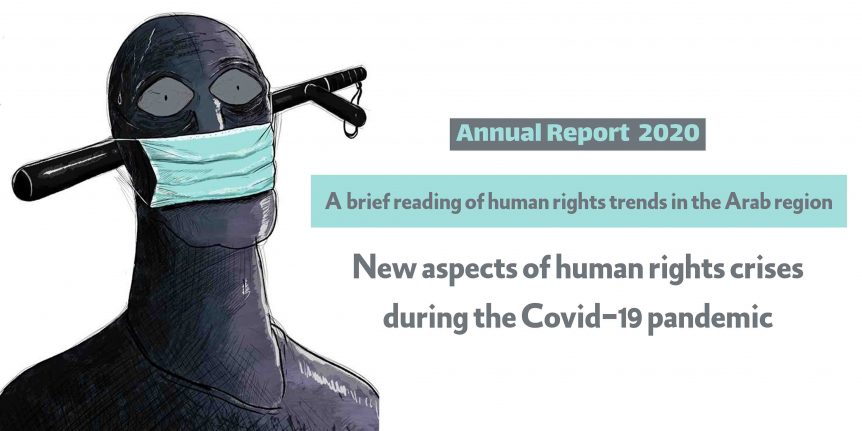“The human rights situation in the Arab region, which has already been deteriorating for years, is deteriorating even more rapidly with the outbreak of the Covid-19 pandemic, especially afflicting economic and social rights, and humanitarian conditions. In many Arab countries, the pandemic has further exposed structural imbalances encumbering the efficiency of public institutions and facilities, particularly in the health sector, amid an absence of social justice and equal opportunities for citizens. The pandemic has also displayed the state’s weakness and fragility in providing social and economic security to its citizens, while increasing the pressures and risks burdening the most vulnerable groups in Arab societies, including women, minorities, foreign workers, irregular migrants, millions of refugees and displaced persons.”
The Tenth Annual Report of the Cairo Institute for Human Rights Studies (CIHRS), “New aspects of human rights crises during the Covid-19 pandemic,” assesses the human rights situation in eleven Arab countries including the Gulf Cooperation Council throughout 2020, a year defined by the Covid-19 pandemic. This assessment includes the most significant trends in human rights violations, especially in relation to the pandemic and the proliferating armed conflicts throughout the region. The influence of regional and international powers on the trajectories of these conflicts, and the severity of their humanitarian costs, is further analyzed from a human rights perspective.
Many governments in the Arab region have sought to cover up their lack of transparency on data regarding Covid-19, while restricting the right of citizens to assess the effectiveness of measures enacted to confront the pandemic. Security measures were strengthened, and activists and bloggers prosecuted in Morocco, Tunisia, Egypt, Iraq, Algeria, and Gulf Cooperation Council countries. These measures far exceed the exceptional circumstances permitted by international human rights law. Covid-19 has represented an opportunity for most governments in the region to pass measures hostile to rights and freedoms, as is the case in Algeria, Morocco, Tunisia, Egypt, and Libya. 2020 saw an upsurge in internet censorship and the violation of digital privacy, taken as measures to confront the Covid-19 pandemic.
“The pandemic exposed the dysfunction and fragility of the health systems serving citizens in their countries across the Arab region. Citizens attempted to criticize this appalling reality in some countries in the region. Having no audible platform from which to address governments and public opinion in defense of the right to life, people voiced their concerns on social media, the only available platform. This expression of opinion online landed some citizens in prison for the first time in their lives. Nonviolent persons, journalists, and even doctors in the frontlines of the pandemic were deprived of their freedom,” said Bahey eldin Hassan, director of Cairo Institute for Human Rights Studies.
Ten years have passed since the onset of the Arab Spring revolutions and uprisings, which to this day have shaped the trajectories and profound crises facing the political and human rights situation in the region. There are indications of a reemergence of the Arab Spring’s values, evidenced by many widespread and ongoing popular protests over the last two years in several countries including Algeria, Sudan, Iraq and Lebanon, and to a limited extent Libya and Egypt. There has been an accompanying increase in demands for social justice and radical political reform, and against corruption, as the political factors and social disparities that ignited the first wave of the Arab Spring have persisted or worsened. Although the pandemic has impacted and stalled popular movements, this appears to be limited to the short-term. Mobilization and protests have been recurring over the past year and the beginning of the new year, with the pandemic further exacerbating the grim social and economic contexts.
Hassan continued, “The year 2021 may constitute another important milestone in the struggle of peoples in the Arab region to determine their political trajectory, and thus the future of their economic, healthcare, and educational systems. It is not the foreign occupation that must be overcome by the peoples of the Arab region, but rather, the occupation or repression of their own ruling governments. The scale of crimes and violations committed by Arab governments against hundreds of millions of their own people would put some former colonial powers to shame. Foreign powers are, however, still complicit in this repression; perhaps none more so the US administration of Donald Trump, which bestowed unconditional political support to several authoritarian governments in the region as well as the Saudi-Emirati coalition in Yemen, acting to reinforce counterrevolutionary forces against the proponents of the Arab Spring. Thus, the Trump administration’s departure represents a key opportunity in 2021. To make the most of this opportunity, not only must political and cultural elites learn from the lessons of the recent past, but they must also learn about their historic task at the present moment, and rise to this task.”
CIHRS Tenth Annual Report: New aspects of human rights crises during the Covid-19 pandemic
A brief reading of human rights trends in the Arab region 2020
Read full report hereCover photo: Rafat Alkhatib – Jordan
Share this Post

